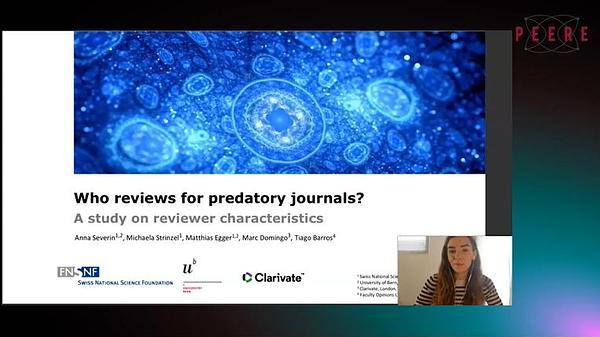Would you like to see your presentation here, made available to a global audience of researchers?
Add your own presentation or have us affordably record your next conference.
keywords:
data sharing and access
open science
peer review
Objective Diverse efforts are underway to reform the journal peer review system. In combination with a growing interest in open science practices, open peer review (OPR) has become of central concern to multiple stakeholders within the scholarly communication process. However, what OPR is understood to encompass and how effective its individual elements are in meeting the expectations of the peer review system is uncertain. Through a discussion of the latest evidence1-3 on uptake and efficacy of these varieties of OPR, the goal of this talk is to orient the audience on the state of the art regarding this growing area of peer review innovation.
Design This talk will introduce the aims of OPR, especially in its relation to the broader open science agenda, and through critical discussion of its key traits (open identities, open reports, and open participation), and the various ways in which they can be combined to modify journal review processes, especially reflecting on progress made in the last years. Results from various strands of work using both qualitative and quantitative approaches will be presented.
Results The talk will present definitions of OPR, guidelines for implementation, and critical reflection of the advantages and disadvantages. The latter will include presentation of first results from a new systematic review of evidence on OPR uptake, attitudes, and efficacy to synthesize what we know on what works in which circumstances, reflect on important barriers to further implementation, and call for research on key areas where more evidence is needed.
Conclusions Open peer review is growing fast, yet key questions regarding uptake and efficacy persist. As a community, we need to be open to these challenges and commit to shared research to address these questions.
References
1. Tennant JP, Ross-Hellauer T. The limitations to our
understanding of peer review. Res Integ Peer Rev. Published
online April 30, 2020. doi:10.1186/s41073-020-00092-1
2. Ross-Hellauer T, Görögh E. Guidelines for open peer
review implementation. Res Integ Peer Rev. Published online
February 27, 2019. doi:10.1186/s41073-019-0063-9
3. Ross-Hellauer T. What is open peer review? a systematic
review. F1000Research. Published online April 27, 2017.
doi:10.12688/f1000research.11369.2
Conflict of Interest Disclosures None reported.
Acknowledgments This presentation reports findings from a range of articles produced by the author between 2017 and 2022 in collaboration with coauthors Serge Horbach, Jon Tennant, Birgit Schmidt, and Edith Görögh, whose contributions the author gratefully acknowledges.


